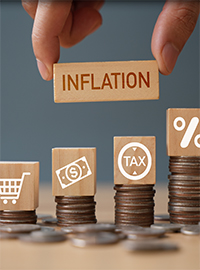| Joe Slaps Lipstick on “Bidenomics” Pig |
 |
|
By Timothy H. Lee
Wednesday, July 05 2023 |
"At least I could buy a car four years ago. I could also afford to fill the tank." That’s the damning sentiment that Joe Biden must confront as voters begin to ask themselves the quadrennial question posed by Ronald Reagan in 1980: “Are you better off today than you were four years ago?” According to Gallup’s latest survey on the question, fully half of Americans say they’re worse off than they were just one year ago, let alone four. Since Gallup began asking that question in 1976, only once has the number reached that peak: amid the depth of the Great Recession in 2009. Accordingly, American voters are even gloomier today than they were when Ronald Reagan asked that question on the eve of his crushing victory over Jimmy Carter. No longer able to ignore or dismiss that hardening “Bidenomics” reality, the Biden Administration resolved to recast it as some sort of positive term. Good luck slapping lipstick on that pig, Joe. It might be different if Biden could point to foreign policy or other achievements to change the subject from an economic landscape that continues to decay under his leadership. That’s not a viable option, however, considering that Biden’s approval/disapproval rating collapsed during his disastrous Afghanistan withdrawal and hasn’t recovered since. Elsewhere, the number of Americans who consider themselves “extremely proud” to be an American has now fallen to a record low under Biden, his unconstitutional initiatives continue to suffer legal defeat after legal defeat in the courts and Americans’ assessment of the state of moral values in the U.S. has dropped to record lows during his presidency. That’s just a brief sample. This week, Gallup also reported that Americans maintain lower levels of confidence in their national government than citizens of any other G7 industrialized nation in the world. Back in 2006, for perspective, the exact opposite was true: Americans at that time maintained the highest level of governmental confidence among industrialized nations. Determined to stand for reelection despite opposition even among Democrats, therefore, Biden went for broke with a high-profile speech attempting to recast “Bidenomics” as a feature, not a bug. “I came into office determined to change the economic direction of this country,” he began. Well, on that count at least, he has succeeded. Biden proceeded to claim that “our economy was reeling” when he entered office, but that’s demonstrably false. According to the government’s official numbers, the U.S. economy grew at 35.3%, 3.9% and 6.3% in the three quarters before Biden’s first full quarter as president. One year into Biden’s presidency, in contrast, we dipped into recession with consecutive quarters of -1.6% and 0.6% contraction in 2022, and growth under his leadership has averaged less than 2.8% per quarter. Accordingly, Biden has brought economic growth toward a gradual halt while in office. Biden then attempted to claim false credit for declining unemployment. “When I took office,” he said, “unemployment was over 6 percent.” What Biden didn’t admit was that the rate had already plummeted sharply from 14.7% from its pandemic highs in the months preceding Biden’s election, or that the rate was just 3.5% before the pandemic and had remained under 4% for over a year under his predecessor. Biden also didn’t mention that initial claims for unemployment have recently crept upward from below 200,000 per week to over 250,000 today, again showing a deterioration under his leadership rather than improvement. Biden also claimed credit for U.S. job creation, but overlooked the deceleration that has occurred under his watch. In the nine months coming out of the pandemic prior to Biden entering the White House, the U.S. averaged over 1 million new jobs each month. Since then, growth has gradually slowed toward the stalling point, according to Biden’s own Labor Department. Toward the end of his speech, Biden finally addressed the proverbial elephant in the room: inflation. “Today,” Biden said, “inflation is less than half, less than half what it was a year ago.” The problem, even he must know, is that it’s still three times what it was when he entered office. From 1.4% in January 2021, inflation ascended to an unsustainable four-decade high of 9.1% one year into his term. Over a year later and two years after his administration labeled inflation “transitory,” it remains at 4%. In addition to being triple the rate of inflation that he inherited, that’s twice the Federal Reserve’s preferred maximum of 2%. Additionally, on the same date as Biden’s speech, Federal Reserve Chairman Jerome Powell admitted that he doesn’t expect that core inflation will return to the Fed’s 2% target until 2025. So much for “transitory.” Worst of all, however, is that Bidenomics has meant a decline in Americans’ standard of living. According to official government data, wage growth exceeded inflation rates throughout the Trump presidency. Under Biden, however, we’ve endured an unprecedented stretch of 25 consecutive months in which inflation exceeded wage growth. Accordingly, “Bidenomics” can be most accurately defined as slowing economic growth, a gradually deteriorating jobs market, high inflation and diminished purchasing power. What Americans hoped to hear from Biden was some sort of policy change and a different course, but none were forthcoming. “More of the Same!” isn’t an appealing 2024 slogan for Biden, but that’s apparently what Americans can expect from him. |
Related Articles : |
























